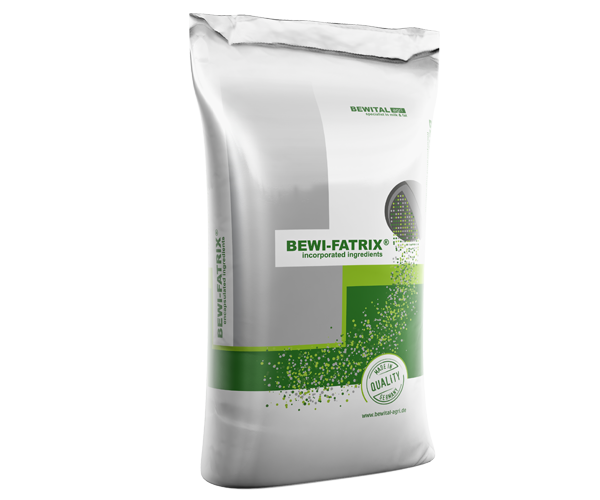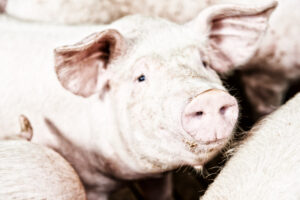Targeted nutritional support reduces piglet losses around farrowing
Modern sow genetics have made impressive progress in recent decades. Larger litters and higher milk yields are now the norm, but they also place considerable pressure on the sow’s metabolism. Around farrowing, sows experience one of the most demanding transitions in animal production: moving from the anabolic state of late gestation to the catabolic, milk-driven phase of lactation. This shift is characterised by oxidative stress, inflammatory reactions and energy deficits. As a result, metabolic disorders such as post-partum dysgalactia syndrome (PPDS) remain among the most frequent causes of reduced performance and piglet losses in practice.
Balancing metabolism under stress
During late gestation and early lactation, nutrient mobilisation and oxidative stress can easily exceed the sow’s natural antioxidant capacity. Lipid mobilisation, necessary to support milk production, increases the formation of reactive oxygen species and inflammatory mediators. These processes can impair liver function, appetite and milk quality, which in turn affects piglet growth and survival.
Traditionally, nutrition around farrowing has focused mainly on covering the basic requirements for energy and nutrients. However, it is increasingly recognised that a purely quantitative approach is not enough. To maintain sow health and piglet vitality, targeted support of the metabolic and immune systems is essential.
Functional feed additives – such as antioxidant vitamins, plant extracts and emulsifiers – offer new opportunities to stabilise the sow’s physiology during this period. Against this background, a field trial was conducted to evaluate the effects of a plant-based complementary feed designed to combine antioxidant, anti-inflammatory and energy-providing functions.
Field trial under commercial conditions
The study was carried out on a commercial farm housing 505 sows under standard European production conditions. All animals received the same basal lactation diet based on wheat, barley, maize, wheat bran and soybean meal. The trial group received an additional 30 g of BEWI-FATRIX® CX, a plant-based complementary feed, per sow and per day, starting seven days before farrowing and continuing until the day of farrowing.
The feed contained a spray-cooled fat matrix for rapid energy supply, rapeseed lecithin to support liver function, vitamins E and C for antioxidant protection, willow bark extract for natural anti-inflammatory effects, and phytogenic compounds from Capsicum annuum to reduce systemic stress. The control group received the same basal ration without supplementation.
Performance data such as number of piglets born alive, piglet mortality before weaning, number of weaned piglets and litter weaning weights were recorded over a five-month period (November 2024 – March 2025).
Improved vitality and weaning performance
The supplementation led to measurable improvements in biological performance compared with the control group. On average, weaning weight per piglet increased by 460 g, and total litter weight at weaning increased by 5.3 kg, despite almost identical litter sizes. The pre-weaning mortality rate decreased by 0.72 percentage points, indicating improved piglet survival.
Importantly, these improvements occurred without changes in feed composition, management or lactation length. This confirms that the beneficial effects can be attributed to the targeted combination of functional ingredients in the complementary feed.
| Parameter | Control group | Trial group | Difference | p-value |
| Number of litters (n) | 269 | 124 | ||
| Number of lactation | 4.2 | 4.5 | + 0.3 | 0.408 |
| Weaning age (days) | 26.7 | 27.1 | + 0.4 | 0.052 |
| Life born piglets (n) | 14.7 | 14.5 | – 0.2 | 0.433 |
| Piglet losses | 8.64 | 7.92 | – 0.72 | 0.656 |
| Weaned piglets/ litter (n) | 13.4 | 13.3 | – 0.1 | 0.863 |
| Weaning weight/ piglet (kg) | 7.71b | 8.17a | + 0.46 | <0.001 |
| Weaning weight/ litter (kg) | 102.9b | 108.2a | + 5.3 | <0.001 |
a,b Values within a row with different superscripts differ significantly (p ≤ 0.05)
Table 1: Selected zootechnical performance data of sows and piglets
Interpreting the results
The observed performance gains underline the close link between metabolic health and productivity. Antioxidant vitamins E and C play a central role by maintaining the redox balance, protecting cell membranes and regenerating each other’s activity. Their synergistic effect reduces lipid peroxidation and helps maintain stable cell function during the high-stress farrowing period.
Willow bark extract complements this mechanism by providing natural salicin, tannins and flavonoids with anti-inflammatory and pain-modulating properties. These compounds help limit systemic inflammation and may promote smoother farrowing and recovery.
Phytogenic substances derived from Capsicum annuum (capsaicinoids) add further benefits. Their antioxidant and vasodilatory effects improve peripheral blood flow and nutrient transport, contributing to a calmer metabolic profile around parturition. Together, these mechanisms support colostrum quality and milk production, which are decisive for early piglet growth and immune protection.
In addition, the inclusion of spray-cooled plant fats with lecithin ensures that energy supply does not become a limiting factor. Lecithin acts as an emulsifier, improving fat digestibility and nutrient absorption while supporting hepatic lipid metabolism. By providing readily available energy during the critical pre-farrowing phase, the product helps reduce excessive mobilisation of body fat – a key trigger of metabolic stress and inflammatory responses.
Implications for practice
From a practical perspective, these findings highlight the importance of supporting the sow’s metabolism before farrowing rather than reacting after problems arise. Supplementation with a combination of antioxidant vitamins, phytogenic compounds and highly digestible energy sources can help stabilise health and productivity during this critical transition.
The improvements in piglet weight and survival achieved under commercial conditions demonstrate that such nutritional strategies can make a measurable difference in both biological and economic performance. In modern production systems, every additional gram of weaning weight and every piglet saved directly contributes to profitability and animal welfare.
Conclusion
The trial results confirm that targeted metabolic support before farrowing can reduce piglet losses and improve litter performance under field conditions. A plant-based combination of functional ingredients – including antioxidant vitamins, willow bark extract, capsaicinoids and lecithin-enhanced fats – proved effective in alleviating oxidative and inflammatory stress around farrowing.
By promoting metabolic stability, the approach enhances sow resilience, milk quality and piglet vitality, offering producers a practical nutritional tool to improve results in high-performing herds.
Further insights into holistic metabolic support strategies in pigs – even under challenging conditions such as heat stress – can be found here.
Our solution:
BEWI-FATRIX® CX is a novel combination of feed and additives. It’s a supplementary feed for high-yielding pigs for holistic metabolic support in phases of increased demand.
- Fat provides additional energy
- With rapeseed lecithin as an emulsifier
- Vitamin C and E with antioxidant effect in the metabolism
- Contains pepper (Capsicum annuum) and willow bark (salix spec.) with all natural components
Add 30 g BEWI-FATRIX® CX per sow per day to the feed.

>> learn more about the product
Here's something else that may interest you:
-
High temperatures lead to problems in pigs

Pigs are equipped with relatively few sweat glands and thus, experience heat periods quite early as they are not able to effectively dissipate warmth. A targeted approach is important to decrease the impact of heat as much as possible.
learn more -
Heat? Adjust feeding!

It is well known that at high ambient temperature it is quite difficult to get enough energy in lactating sows. However, with an adapted feeding strategy, sufficient energy intake can be ensured even in summer, when temperatures are high.
learn more -
How to support the metabolism of pigs holistically – even during hot periods

Pigs are particularly sensitive to heat due to their physiology. As a result, there is a risk of heat stress - a condition that is associated with a variety of negative consequences for the metabolism, health and performance of the animals.
learn more